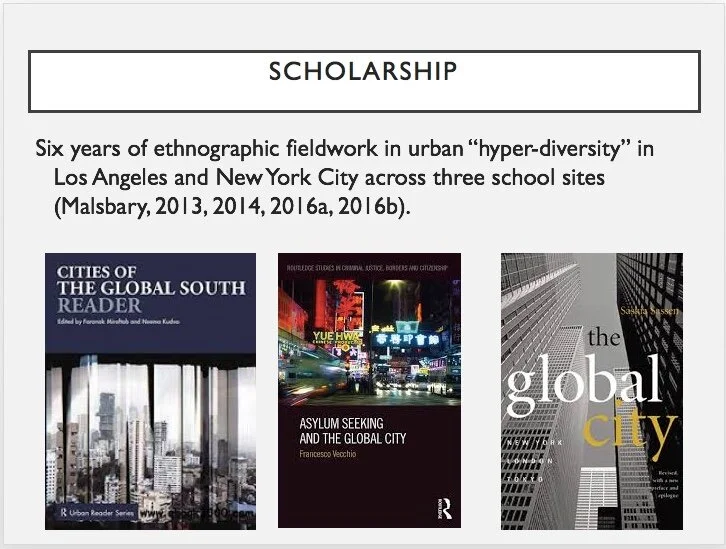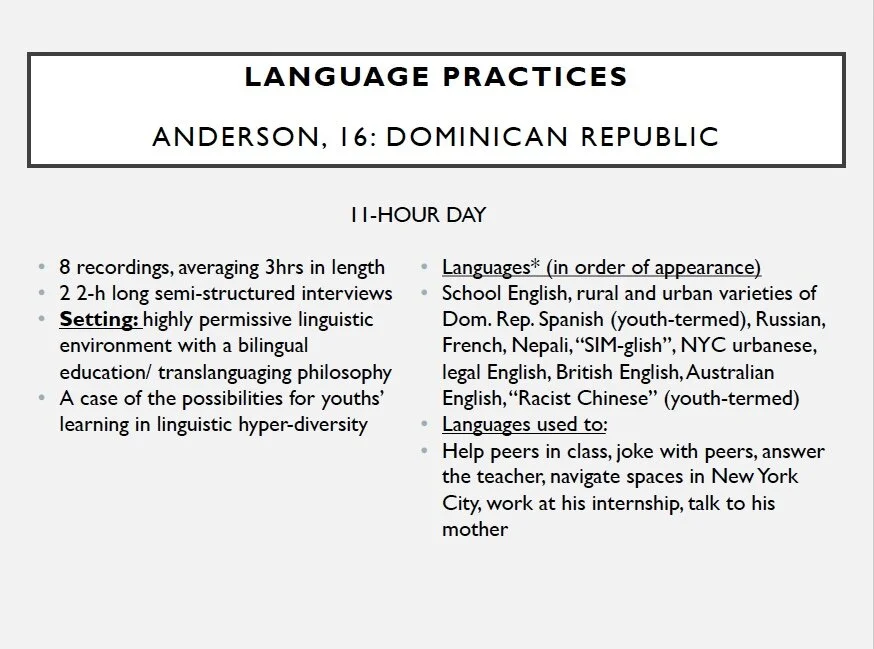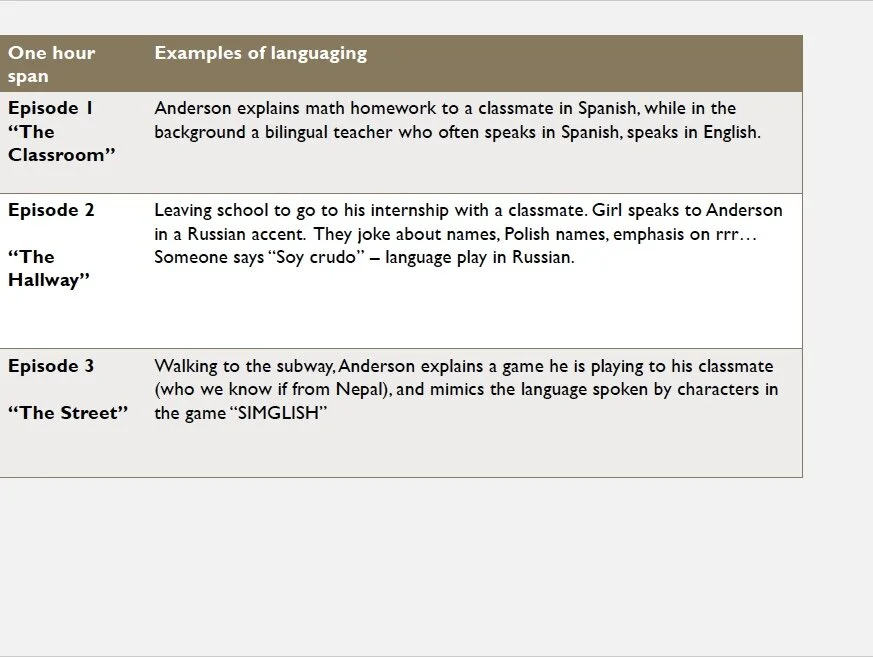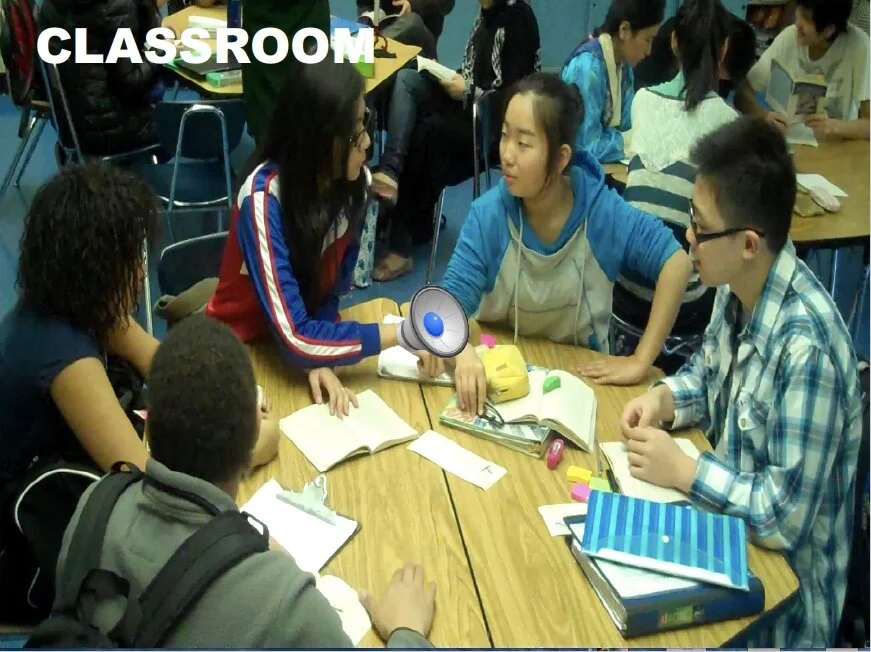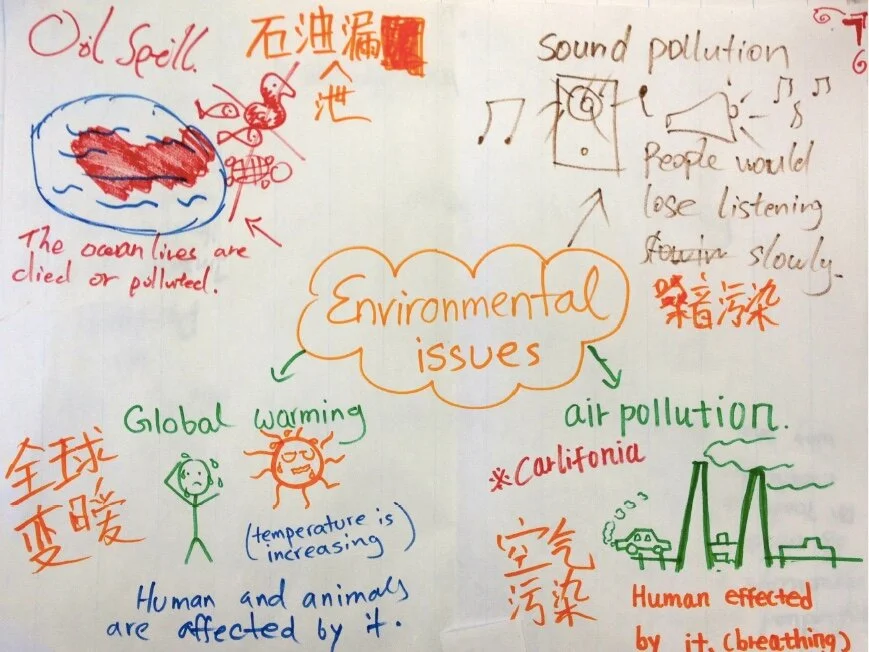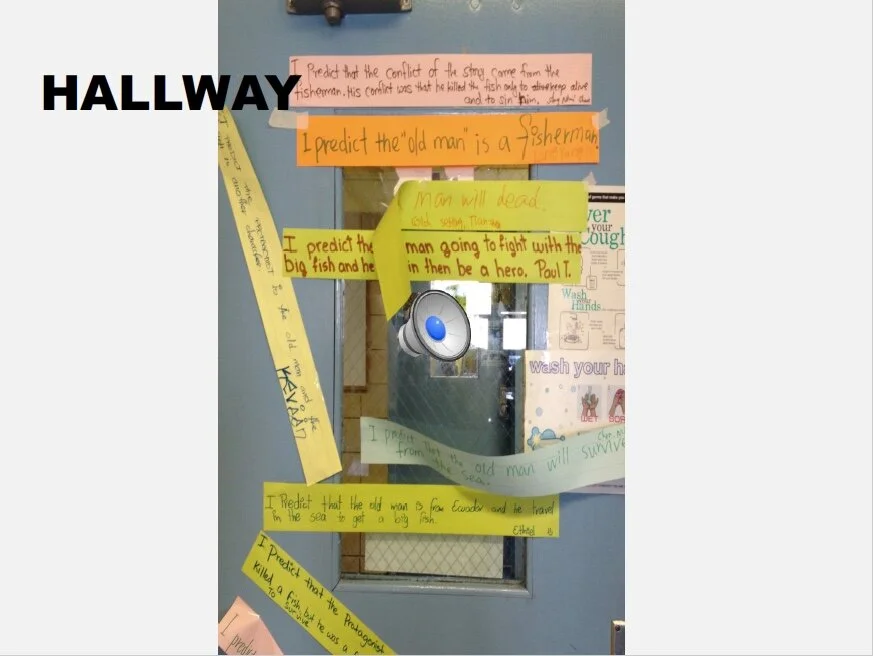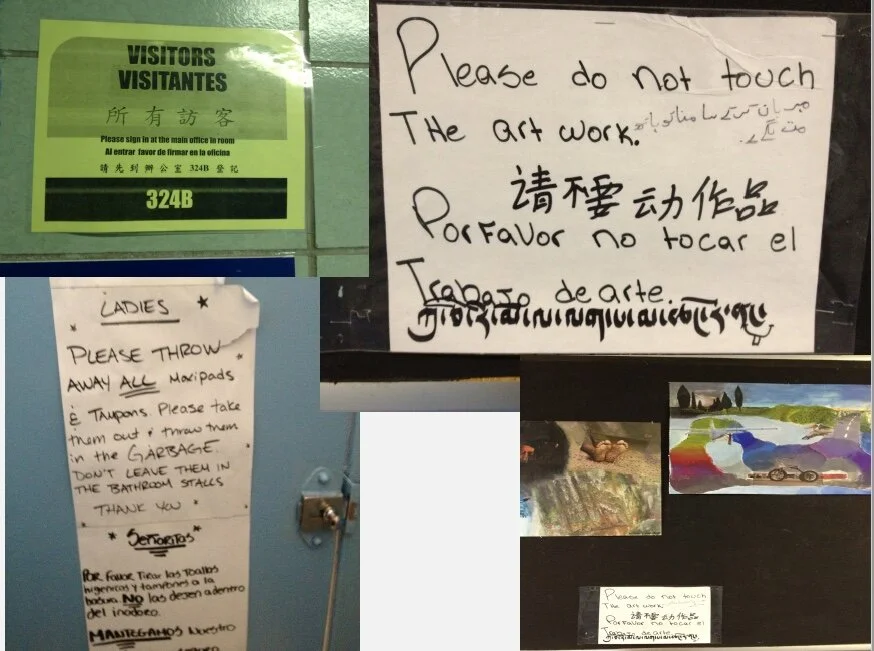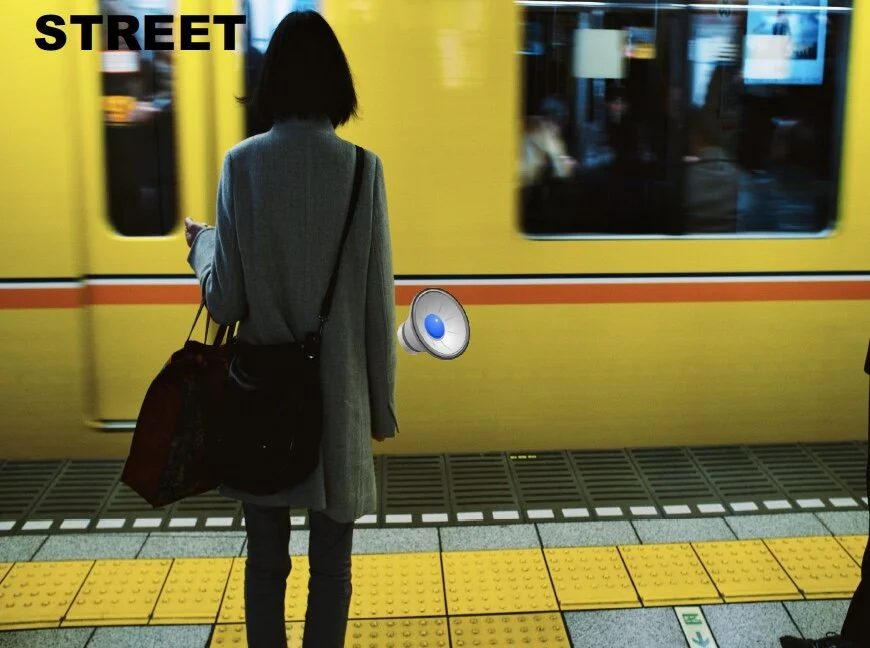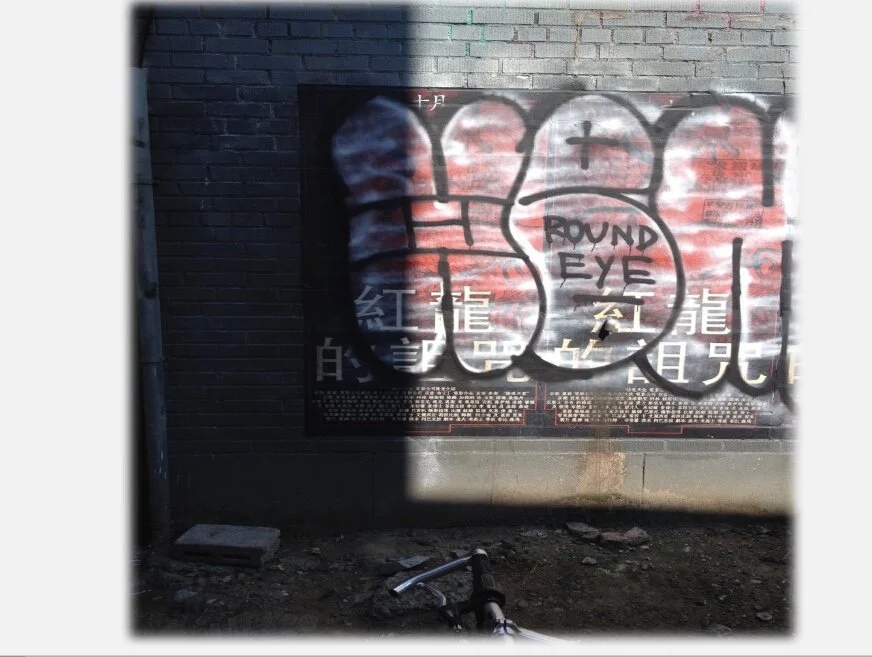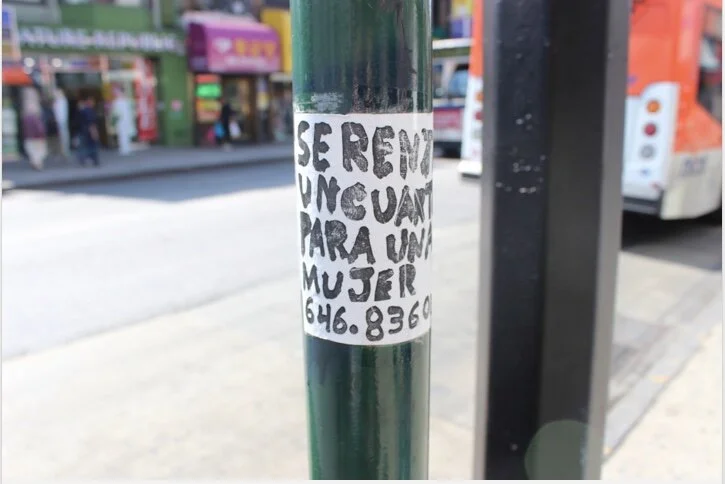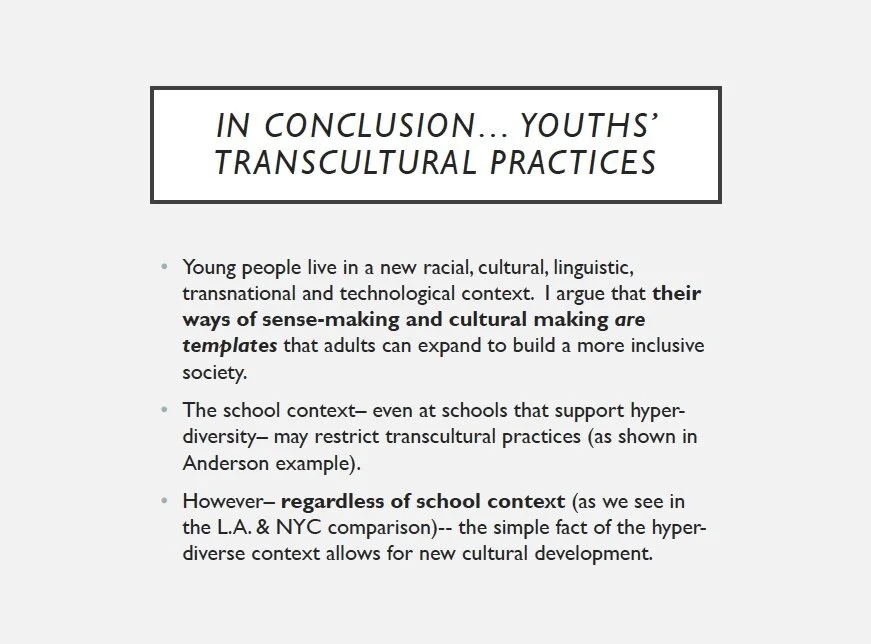ETHNOGRAPHY
noun. /eTHˈnäɡrəfē/
The scientific description of the customs of individual peoples and cultures (Oxford Dictionary).
Coming of Age in Hyperdiversity, 2010 - 2016
(Note: All work published under my former name, Christine Brigid Malsbary or Christine B. Malsbary)
A six year ethnography of young people in globalized, multilingual and multicultural contexts, I wove 3 core concepts into the fabric of Coming of Age in Hyperdiversity.
democratic participation
empowerment
healing
As an abuse survivor myself, raised a biracial child across three countries and two languages — quite literally nameless and voiceless — I choose not to reproduce research that the bore a stench of colonialism under the guise of scientific discovery. Rather than act on people and take their knowledge back to my prestigious universities, I wanted to act with people. I understood ethnography as a method of empowerment. Interviews and data gathering were opportunities for testimonio, as my Latinx friends called it — opportunities for communities to tell their own stories of harm, healing and celebration in their words.
Electing to study at UCLA (one of my best manifestations, as I had been a high school dropout with a D average), was strategic. I had purposefully gone to the most elite institutions I could get into in order to provide social agency to myself and my research participants, who were the indigenous of the South Pacific, immigrants in big city “ghettos”, refugee child soldiers, girls of color, urban gang members. I surmised that access to well-resourced institutions could give those us who came from hurt places ways to stay safe via the social vehicles of validation, “stamps of approval” and pathways to lives worth living.
I used traditional participant-observation, writing hundreds of pages of fieldnotes from over 17 data collection sites in New York City, Los Angeles, Hawaii and American Samoa. Within that broad methodological brushstroke, I used the principles of decolonizing methodologies (first conceptualized by indigenous researcher Linda Tuhiwai Smith).
Working in collaboration with my research participants, we collected video, photographic, and survey data in multiple languages. I gave kids audio recorders and we captured hundreds of hours of their talk across contexts as they moved from the classroom, to the subway, to afterschool jobs and their homes. Youth were given control over what they shared with me, and what I shared with the outside world. My youth & teacher teams and I checked our emerging research assumptions with individual and focal group interviews, adding a second layer of validation and permission. I also collected classroom work, teachers’ curricula, policy documents, and sat with youth as they showed me their art, media, friends and other online activities, narrating their own experiences from their viewpoint.
results
Out of Coming of Age in Hyperdiversity, I produced 15 academic papers, 2 teacher education programs, several viral blogs read nationwide, six new courses and over 20 talks given all over the world.
I circled one key theme, a central finding that echoes and reverberates today (as I construct this page this in the wake of the George Floyd protests) more than ever.
We are missing an opportunity to create an extraordinary new society.
“My kids” as I called them — the 9th, 10th, and 11th grade students I researched — are a generation of globally-savvy, creative, powerful intellectuals. They are brilliant, make no mistake, and they have the power to show us how to live better.
We adult humans are missing it. We label these global powerhouses “ESL students” and ghettoize them in bad school programs. We fail them with abstractly-constructed tests that don’t show what they can really do (Malsbary, 2014). In New York City, the largest school district in the nation, only 26% of these kids graduate from high school (NYES.gov).
What that means is that 74% of young people who speak multiple languages, have deep and wide comparative political & economic savvy, and how have tremendous resilience from their global migratory journeys — kids who could be the next generation of doctors, engineers or Silicon Valley entrepreneurs — have been systematically deleted from the public good. We are absolutely missing the enormous opportunity the children of global migration growing up next door to us present — and it is to our detriment, not theirs.
Once upon a time, the financial and political elite created policies that benefit the sharing of money and goods across borders, and then sanctioned globalization with national policy like Lyndon B. Johnson’s Immigration Act of 1965. My ethnography shows that the children of global migration have come home. These children live agentive lives that resource linguistic, intellectual, social and cultural diversity as true assets (Malsbary, 2016; Malsbary, 2013; ). They leverage their global backgrounds and intercultural ways of being as gifts to help themselves and others create incredible lives and produce work.
Look, here is the real talk. My kids, degree or no degree, will be fine. They will make their lives fun and bright, and work it out for themselves. They are survivors. My concern is actually for the rest of us — what kind of world can we narrow-minded, white-washed adults possibly create without them?
Want more?
Watch Kickin’ It in the Transcultural City
Talk presented for faculty & students at the University of Colorado, Boulder in 2016.
praxis.
noun. /ˈpraksəs/
The gap between theory and practice, text and world (Oxford Dictionary).
As a critical ethnographer, I believed that research for research’s sake was a dying paradigm. During my studies for my Masters’ from the University College London, I had come to understand research, photography and museums as a tool of colonialism, a way for the “civilized” to curated, calculate, and the so-called unknown, primitive and wild.
I felt was my ethical responsibility, as a young biracial woman who had benefitted from the financial legacies of colonialism and slavery by virtue of my scholarships and sponsorships to train, that my intellect and productivity provided value not only to scholarship and the academy, but most importantly to the communities who had shared their lives on the page.
Within three years of graduating UCLA I had published in the top journals in my field here, here, and here. Within five years I had received the prestigious Spencer Postdoctoral Fellowship, and presented my work at the National Academy of Education, here. The awards from my colleagues were heart-affirming, and still it was crucial that I answer the questions: research for whom? research for what purpose?
And so, from the years of 2005 - 2016, I shared my knowledge, skills and training with teachers, teacher educators, policy designers, state policy stake-holders, school designers and principals to benefit communities of color, recent arrival immigrants, and others, aptly named by poet Tupac Shakur as the roses that grew from concrete.
The Rose That Grew From Concrete
Did you hear about the rose that grew
from a crack in the concrete?
Proving nature's law is wrong it
learned to walk with out having feet.
Funny it seems, but by keeping its dreams,
it learned to breathe fresh air.
Long live the rose that grew from concrete
when no one else ever cared.
ahava (אהבה).
noun and verb, Hebrew meaning “love.”
“We rejoice and delight in you; we will praise your love…” (Song of Songs 1:4).
stay tuned. the rest of this page will be finished soon. thanks for visiting!
Citations & Publications
RESEARCH
Research Projects Completed
Belonging in a multiethnic, multilingual high school, 2009-2011
· 18-month school-based ethnography of immigrant youths' sense of belonging in a hyper-diverse public school in Los Angeles
Teaching and learning in super-diversity, 2013
· Video-based case-study of learning and teaching practices in a hyper-diverse school serving recent-arrival immigrant youth in Queens, NY
Teachers as policy-makers, 2014-2016
· Spencer Foundation funded multi-site ethnography documenting the ways in which high school teachers working with multiethnic, multilingual immigrant youth negotiate district policy reform in NYC
Competitive Funding (in order of funding received)
1. $1500.00 -- The Carolyn Grant '36 Endowment Fund, Vassar College 2015
2. $825.00 -- Frances D. Fergusson Faculty Technology Exploration Fund, Vassar College, 2015
3. $55,000.00 -- NAEd Spencer Postdoctoral Fellowship, 2014-2015
4. $800.00-- University Research Council, University of Hawaii, 2014
5. $6,000.00 -- American Association of University Women, 2013
6. $300,000.00/ 5 years-- Office of English Language Acquisition, Department of Federal Education, 2013 [unfunded]
7. $1200.00-- University Research Council, University of Hawaii, 2013
8. $5,000.00 -- College of Education, University of Hawaii, 2012
9. $20,000.00 --UCLA Dissertation Year Fellowship, 2011
10. $10,000.00 --Graduate Student Departmental Fellowship, Graduate School of Education, UCLA, 2007
11. $5,000 -- M.A. Thesis Fieldwork Grant, University College London, University of London, 2002
PEER-REVIEWED JOURNAL ARTICLES (*select)
Malsbary, C. B. (2016). Youths' and schools' practices in hyper-diverse contexts. American Education Research Journal.
Malsbary, C. B. & Appelgate, M. (2016). Working Downstream: A beginning ESL teacher negotiating practice and policy. Language Policy 15(1), 27-47.
Hopkins, M., Malsbary, C. B., & Morales, P. (2016). Responsive Federal Policy for Bi/Multilingual Students. Education Law and Policy Review.
Malsbary, C. B. (2013). “It’s not just learning English, it’s learning other cultures”: belonging, power, and possibility in an immigrant contact zone. International Journal of Qualitative Studies in Education, 27(10), 1312-1336.
CHAPTERS, REVIEWS, ESSAYSMalsbary, C. B. (2018). Invited chapter for Orellana, M. and Garcia, I. (eds.) Everyday Learning: Leveraging Non-Dominant Youth Language and Culture in Schools.
Malsbary, C. B. (2018). Invited chapter for Pacheco, M. and Morales, L. (eds). Transforming Schooling for Second Language Learners: Policies, Pedagogies, Practices. Information Age Publishing. SELECT PRESENTATIONS (*select)
International & National
"Racism and ethnography at a time of political and policy upheaval." Paper presented for Stephen May's panel on Critical Ethnography, AAAL in Portland, OR, March 2017.
"A day in the life of a multilingual young person." Paper presented at AAA, Minneapolis, November 2016.
"Linguistic Landscapes in Queens, NY & Los Angeles, CA." Paper presented for the Language, Education and Diversity conference, Auckland, New Zealand, November 2015.
EDUCATION
Ph.D. Social Sciences and Comparative Education. Graduate School of Education, University of California-Los Angeles, 2012.
M.S. TESOL, City College, City University of New York, 2005.
M.A. Anthropology of Art and Visual Culture, University College London, University of London, 2002.
B.A. Art History, cum laude, Temple University, Philadelphia, 2000.
Awards & Fellowships
National Academy of Education Spencer Postdoctoral Fellow, 2015-2016
Exemplary Diversity Scholar, University of Michigan Center for Institutional Diversity, 2012-2013
Nomination for Outstanding Dissertation of the Year, American Anthropology Association, 2012
Finalist, University of Chicago Postdoctoral Fellowship (ranked 4th out of 460), 2012
Dissertation Year Writing Fellowship, University of California-Los Angeles, 2010- 2011
Graduate Student Mentorship Award, UCLA, 2008
Outstanding Service Award for Field Supervision, Teacher Education Program, UCLA-Center X, 2008
Fulbright Scholar (Egypt and Israel), 2007
New York City Writing Project Fellowship, 2007
New York City Teaching Fellow, 2003-2005
”

